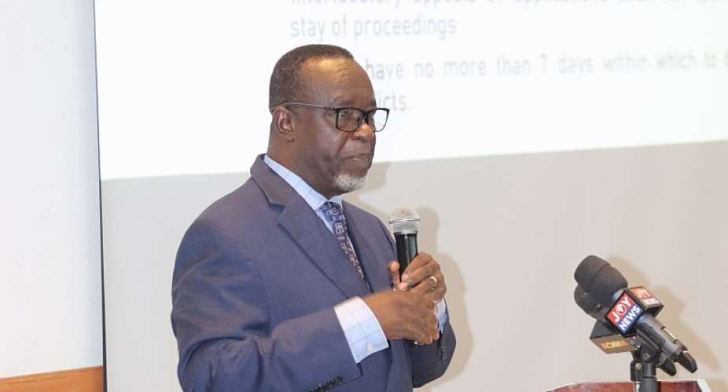On July 28, 2025, at the commissioning of the University of Professional Studies, Accra (UPSA) Law School’s new moot court facility, Acting Chief Justice Paul Baffoe‑Bonnie made it clear: legal education in Ghana cannot—and should not—be open to “just anybody.” The General Legal Council (GLC) is steadfast in its commitment to maintaining quality standards, even amid pressure to expand access.
Justice Baffoe‑Bonnie noted that while increasing access to legal education is appealing, such ambitions must not compromise the profession’s quality. “We are not going to open the gates just to let anybody at all get in. You must be proud when you get a chance to enter the Law School. You should be able to tell yourself that I have gotten here through hard work and merit,” he told the gathering. He further affirmed that the GLC is collaborating with the Attorney‑General’s Chamber to craft sustainable solutions to expand access while preserving rigorous standards.
Baffoe‑Bonnie commented on a recent disturbing incident in Tema, where a lawyer allegedly stole and attempted to sell a colleague’s mobile phone. The case, exposed via a tracking app, highlighted troubling ethical decay within the profession. He insisted that integrity must be central to professional conduct and argued for the integration of legal ethics throughout law curricula—not treated as a one‑off subject but woven into all levels of training: “An undisciplined lawyer is no lawyer at all”
Beyond these concerns, the event spotlighted UPSA’s new moot court. Justice Baffoe‑Bonnie hailed the facility as more than bricks and mortar, describing it as “a bold step towards fostering justice, equity and the rule of law in our nation.”
Prof. John Kwaku Mensah Mawutor, Vice‑Chancellor of UPSA, emphasized that the moot court brings classroom theory to life. “It is where law comes alive,” he said, urging students to approach their calling with humility, integrity, and the willingness to listen and defend justice
Likewise, Prof. Ernest Kofi Abotsi, Dean of UPSA Law School, reinforced the institution’s dedication to experiential learning. He said the moot court signals leadership in legal education, combining theoretical knowledge with practical application.
The facility seats approximately one hundred, with a bench accommodating up to five judges. It is adorned with the writings of legal luminaries such as John Mensah Sarbah and Justice N. A. Ollennu. For the inaugural mock hearing, six students—three on each side—re-enacted the landmark case Alexander Afenyo‑Markin vs Speaker of Parliament & Attorney‑General, renamed Romeo Asante vs Speaker & AG. The original case resolved that an MP does not lose their seat if they declare intent to contest on a new party’s ticket, ruled by a 5–2 majority by the Supreme Court. A three‑judge panel led by Justice Kweku T. Ackaah‑Boafo presided, among other Supreme Court Justices present including Justices Issifu Omoro Tanko Amadu, Henry A. Kwofi, Richard Adjei‑Frimpong, and Gbiel Suurbaareh.






